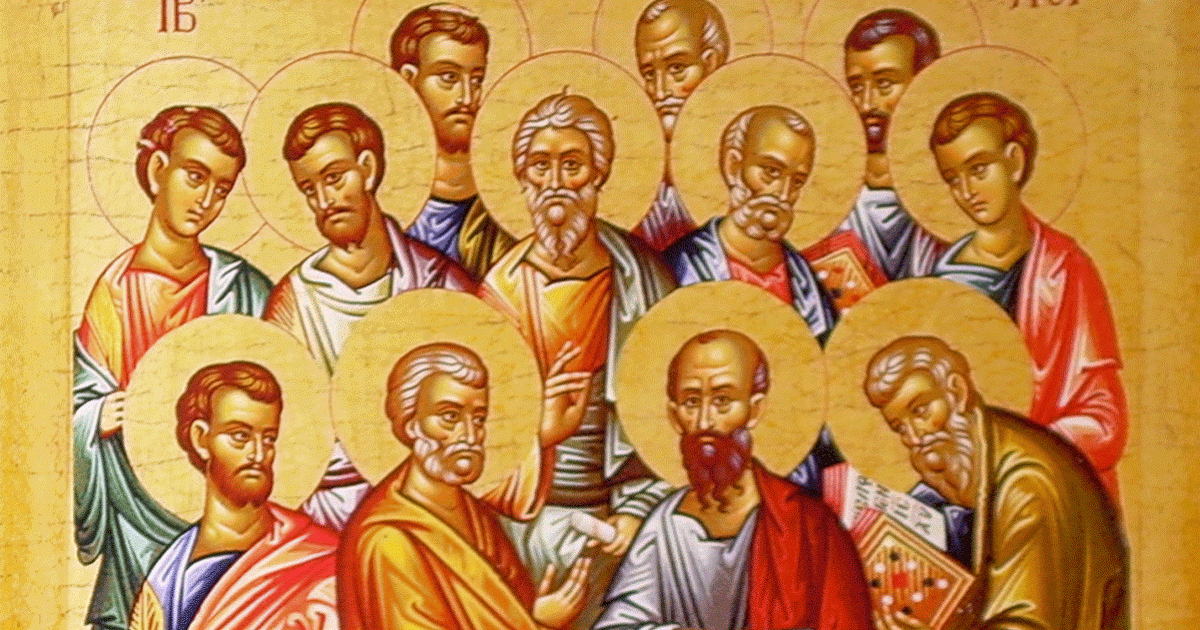Together with these blessed powers, loving Master we sinners also cry out and say: Truly You are holy and most holy, and there are no bounds to the majesty of Your holiness. You are holy in all Your works, for with righteousness and true judgment You have ordered all things for us.
(Divine Liturgy of St. Basil the Great, p. 25)
—
My soul yearns for Thee in the night, my spirit within me earnestly seeks Thee. For when Thy judgments are in the earth, the inhabitants of the world learn righteousness.
Isaiah 26:9
The English translation of the prayer we are about to reflect on over the next several days consists of less than 700 words and these words, written so beautifully by St. Basil in the 4th Century, summarize the entire history of our salvation, from the Creation, to the Fall, to the coming of Christ, to the second Coming of Christ.
The phrase “together with these blessed powers” refers to the order of the angels that were mentioned at the end of the last prayer. It is the angels who cry out with the hymn “Holy, Holy, Holy, Lord of Sabaoth” (Divine Liturgy of St. Basil, p. 25) and are privileged to join in with their song. In fact, when we celebrate the Divine Liturgy, following the Cherubic Hymn, we are reminded that the Gifts we have presented are “invisibly escorted by the angelic hosts.” (Divine Liturgy of St. Basil the Great, p. 16) This means that the angels are celebrating the service together with us. As an aside, I remember early on in my priesthood, an older priest once said to me that when I walk down the aisle during Orthros and cense pews that are largely empty, that I should offer incense over each one, because while they are not filled with people, they are filled with angels.
The elements of prayer include thanksgiving to God, intercession to God and the saints on behalf of ourselves and of others, confession of sins, as well as supplication to God, asking for the things that we need. Before any of these elements happen in a prayer, each prayer should begin with an acknowledgement of God—His divinity, power, glory, etc. This is why we don’t begin a prayer with “Hey, I need such and such.” We begin by acknowledging the name of God. Thus, the prayer begins addressing God as “loving Master,” which both affirms His love for us, and also sets the relationship that He is Master, and we are servant. He is God and we are not. He is at the center. This seems very basic, the idea of God at the center. In the world today, there is a lot of self-centeredness, where we put ourselves in the center and God revolves around us, rather than putting God at the center and planning out life around Him. Prayer begins by affirming that God is at the center.
Before diving deep into prayer, it is good to spend a few moments reflecting on the majesty of God. This prayer does that as well. The word “Holy” means “set apart”. By describing God as “Holy”, we acknowledge that He is set apart. As the Creator, He is higher than all of creation. Not only is He Holy (there have been many people we consider holy), He is “most holy”, more holy than all others. In fact, there is no bounds to the majesty of His holiness. That means we cannot quantify His holiness. It exceeds our ability to describe or comprehend.
Every one of His works is holy. That is something unique to God. Even the holiest of people has had unholy moments. That’s because sin and holiness are incongruent. We can’t actively be sinning and holy at the same moment. Even the holiest of saints was not holy every moment of their lives, as they, and we, are all sinners and have all had moments when we are anything but holy.
In the hymnology of our church, we will find hymns that praise God and that supplicate God (they ask for things). However, the majority of hymns in the Orthodox Church are didactic, they teach us about God. They neither praise nor supplicate. They teach. While most liturgical prayers supplicate God, there is also an element of praise in most prayers. And in this prayer in particular, there is an element of being didactic and teaching. I can’t think of any other prayer (though there may be a few out there) that is more didactic than this. We move from praise of God and acknowledgement of His divinity, to the teaching that God has ordered all things for us, because of His “righteousness and trust judgment.” (Divine Liturgy of St. Basil the Great, p. 25)
While not every line of liturgical prayer comes from Scripture, there are usually Scripture passages that somehow correlate. Today’s verse from Isaiah 26:9, we hear of the judgment and righteousness of God, which are God’s motives, according to the prayer for why He has ordered all the things He has ordered for us. Our next several reflections will take us through this plan that God had to not only create the world, but redeem it when it fell through sin, and His plan to sustain the world, through the church, during the years between His Resurrection and second coming.


0 Comments